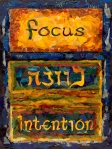This is my #BlogElul post, Day 3, which originally appeared at Kol Isha, where I occasionally guest-blog.
******
The first time she said it, I am pretty sure I rolled my eyes. The second time too. Probably the third and fourth times too. But somewhere along the way, the dimmed lights, candles burning, and the sounds of everyone else’s ujayyi breath lulled me into acquiescence.
I should state, for the record, that I had never been much of a yogi. Give me a good spin class or dance class, or sign me up for a 5K any day. If I am going to be exercising, I want to be breathing hard, sweating, and probably wondering if I am going to make it. But stretching myself, finding balance, and taking a moment of stillness? That sounds like hard work.
But, I fell in love with a dance class—and a community—and yoga came with it. And so,several days a week, I found myself closing my eyes, breathing deeply and finally giving in. “Take a breath. Let it travel through your body. And, just when you think your lungs are full—sip a little more air. And then a little more. Hold the breath, and in this space: Set an intention for your practice.” Yeah, right. Can't we just start dancing?!
Somewhere along the way, though, I noticed that my experience in those opening moments shifted. I stopped rolling my eyes, and started closing them. I stopped smirking, and started breathing. And I began to set an intention—sometimes an inward reflection. At first, my intentions were solely fitness-based: Lose weight. Get in shape. Tone my arms.
But as those physical changes actually did start to happen, I noticed that my intentions grew more expansive, if still totally embodied: Love my shape. Celebrate my body’s abilities.
Then, my intentions grew wider, more integral to the life that I was living. Sometimes a specific goal. Sometimes a one word plan: Hope. Contentment. Focus. And my dance became more than just a way to work out.
Sadly, I had to leave my studio behind. But I often hear my teachers' words when I embark on a new project, a new endeavor. And they came right back to me as I began Daf Yomi a few weeks ago. While I am not sure I will be able to finish it, I have—for the time—committed to studying a daf (two pages) of Talmud every day…for 7.5 years. And I thought to myself—I better set an intention. And so I did. One of discpline, of learning lishmah (for its own sake, and of rejoining a conversation I think desperately needs our liberal, female voices.
The Talmud begins with a discussion of the recitation of the Shema. After a thorough discussion of when to recite Shema, the rabbis begin to ask how we recite Shema. The case that they bring is of someone who is engaged in Torah study of some sort of another—even studying the verses that contain the words of the Shema—when the time arrives for the recitation of Shema. What, they ask, is he to do? The rabbis teach that if he directs his heart towards the recitation of the Shema, he (or she, I suppose!) has fulfilled the obligation to recite the Shema.
The word for “direction” here is kavannah. While it is often used to describe the parts of the prayer service that happen organically, in contrast to the fixed liturgical pieces, it more correctly means “intention.” It means your internal compass is focused, directed, on what you are doing—or what you hope to do.

And the Gemara continues with one short, weighty statement: Mitzvot require kavannah. To engage in the significant acts of Jewish life, it is not enough to do so woodenly, robotically, without deep thought and commitment.
As Elul begins, we are asked to take spiritual stock, to reflect on the year that was—to consider who we have been and what we have done. And this “inventory” we are asked to take should inform who want to become and the steps we’ll take to get there.
So, I invite you to sit. Close your eyes. Breathe deeply. Breathe in a little more. And set an intention for your practice.

No comments:
Post a Comment